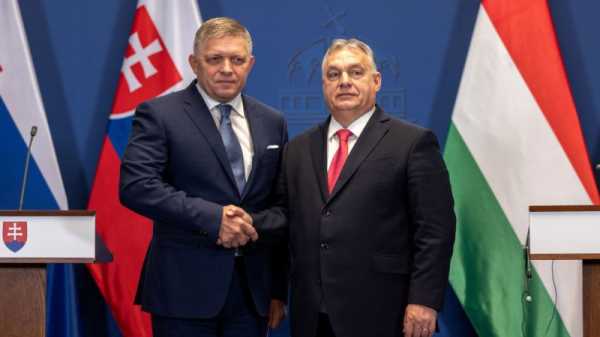
With Georgia passing yet another controversial law, this time against LGBTQ rights, a growing number of post-socialist EU states, such as Slovakia, Bulgaria and Hungary, appear eager to adopt similar laws, raising concerns within the EU about violations of its laws and the influence of pro-Russian ideologies.
Just weeks before crucial parliamentary elections on 26 October, Tbilisi passed a controversial anti-LGBTQ law that immediately drew comparisons to Russia’s repressive ‘gay propaganda’ law.
The law pushed by the Georgian Dream party restricts “propaganda of same-sex relationships and incest” in schools and on television, bans gender reassignment and prohibits adoption by gay people. This prompted EU and human rights organisations to sound the alarm, warning that it would severely restrict the rights of queer people in the country.
By adopting this legislation, Georgia is moving one step closer to its Russian neighbour and further away from the EU – a direction that starkly contrasts the aspirations of the overwhelming majority of the Georgian public.
However, LGBTQ rights are increasingly under threat in other post-socialist EU states, with Slovakia and Bulgaria being the most recent examples.
Hand in hand with Sofia, Bratislava and Budapest
In August, Bulgaria passed a law proposed by the pro-Russian Revival party banning any kind of educational programmes on ‘non-traditional sexual orientation’ in schools, ignoring calls from the Council of Europe and civil society activists to reject it.
EU Equality Commissioner Helena Dalli wrote to the Bulgarian minister: “The Commission is concerned about any development that could put at risk the effective implementation of EU legislation, including the observance of the fundamental rights enshrined in the Charter of Fundamental Rights of the EU.”
Meanwhile, Slovakia’s far-right ruling party, the SNS, has introduced its own anti-LGBTQ law, which seeks to establish a clear definition of ‘non-traditional sexual orientation’ and to ban its ‘promotion’ and the dissemination of related ideas in schools, with violations punishable by fines of up to €30,000.
Slovak politicians echoed the rhetoric of the Georgian Dream, citing the need to “protect the country’s traditional moral values enshrined in the constitution.” For the time being, this proposal has been sidelined due to ongoing disputes within the coalition of Prime Minister Robert Fico.
A parallel with foreign agents’ law
Earlier this year, Georgia passed another Russian-style “foreign agents bill”, which ultimately led to the suspension of Tbilisi’s EU candidate, although it will not be granted until December 2023.
The Georgian Law on Transparency of Foreign Influence, like its Russian counterpart from 2012, requires media, NGOs and other non-profits to register as “pursuing the interests of a foreign power” if they receive more than 20% of their funding from abroad, effectively stigmatising them.
Both the anti-LGBTQ and foreign agent laws have already been implemented in Hungary, leading to Viktor Orbán’s conflict with the EU. As a result, Fidesz was forced to withdraw the latter law and continues to face legal action from the Commission over the anti-LGBTI legislation.
This is not stopping Slovakia and Bulgaria from trying to follow suit, with their own anti-foreign influence legislation in the pipeline this year.
Bratislava’s bill would require labelling of individuals who receive more than €5,000 a year in foreign funding, while Sofia has set the threshold at €500.
While the outcome in Sofia remains to be seen, Slovakia has suspended its proposal amid backlash from civil society and the EU.
“We are currently working on a new proposal,” said Peter Kmec (Hlas-SD/NI), Deputy Prime Minister for the Recovery Plan.
“The new legislation will consider the findings related to the Hungarian precedent,” he concluded.
(Natália Silenská | Euractiv.sk)
Source: euractiv.com



